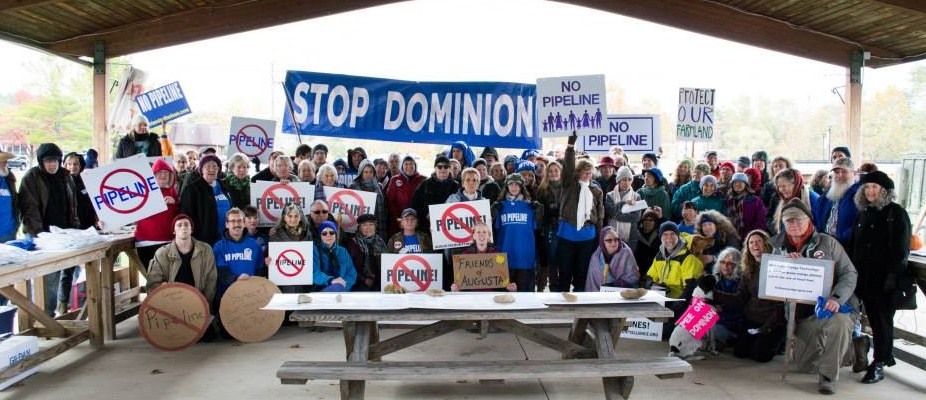On Friday, June 23rd, the Federal Energy Regulatory Commission (FERC) released its final environmental review for the Mountain Valley Pipeline (MVP). The highly-flawed Final Environmental Impact Statement (FEIS) paints a false and misleading picture of this massive, dangerous fracked-gas pipeline.
The FEIS does not spell good news for pipeline opposition, but it is far from final approval. There are many stages left in the process at the federal, state, and legal levels — and there is a growing movement committed to stopping this pipeline, along with Dominion’s proposed Atlantic Coast Pipeline (ACP), a pipeline of similar size and route. This growing resistance, alongside the shift in political narrative around these pipelines, show that the FEIS will only further the conviction and resolve of the growing anti-pipeline movement.
The Pipeline Pledge of Resistance is just one example of this conviction. The hundreds of people who have signed have pledged to engage in any tactic necessary to stop the ACP and MVP — including nonviolent civil disobedience and even risking arrest. To date, nearly 400 people have pledged to risk arrest to stop these pipelines. Plus, nearly 1,000 have pledged to engage in some form of support for those willing to participate in dignified civil disobedience to stop these radical infrastructure projects.
Those familiar with FERC’s history are not surprised by its shoddy environmental review. Since 1986, FERC has approved every proposal for a fracked-gas infrastructure projects that it has come across, with the exception of the Pacific Connector Pipeline and accompanying liquefied natural gas export terminal in 2016.1 Many of these projects have resulted in spills and even explosions. Furthermore, the agency has very strong ties to the very industry it is tasked with regulating. Since 2000, 12 of 15 former commissioners are “currently employed either directly or indirectly in the fossil fuel industry as executives, directors, partners, lobbyists, and/or consultants.”2
The opposition to the proposed fracked-gas pipelines is not just limited to those who have signed the Pledge. In recent months, the opposition has reached a fever pitch. Numerous groups and organizations have voiced their disapproval of the pipelines. In January, a letter signed on behalf of members of numerous indigenous tribes in the region denouncing the Atlantic Coast Pipeline was released to the public.
 Photo from Flickr user Joe Brusky with a Creative Commons license.
Photo from Flickr user Joe Brusky with a Creative Commons license.
In April, announcements that both of these pipelines would trigger miles of ridgetop removal shocked public conscience throughout the region, with various Appalachian Trail hiking groups and enthusiasts assembling in Richmond last month to call upon Virginia Governor Terry McAuliffe to use his authority to reject the projects.
Finally, in May, a band of Virginia-based military veterans, representing every branch on the military, released an open letter to the Governor, linking the the MVP and the ACP to the movement against the Dakota Access Pipeline in North Dakota.

The broadening of the anti-pipeline movement in Virginia is indicative of a larger shift in the Commonwealth’s political culture. The contentious gubernatorial primaries this year in the state were dubbed a “referendum on pipelines”, with anti-pipeline candidates from both major parties winning districts along the proposed routes of these pipelines. Furthermore, over 50 Democratic candidates for Virginia’s House of Delegates have pledged to refuse money from Dominion Energy, the primary shareholder in the ACP and the largest contributor to political campaigns in Virginia.
Regardless of FERC’s announcement, the efforts to stop these pipelines in order to protect our land, water, communities, and climate will ultimately come from the massive grassroots movement. The movement has brought together folks from across Virginia from all walks of life with a common goal — and they are willing to put the their bodies on the line to achieve it.
1http://public-accountability.org/2017/02/oil-gas-industry-dominates-federal-agency-responsible-for-pipeline-approvals
2Ibid.





